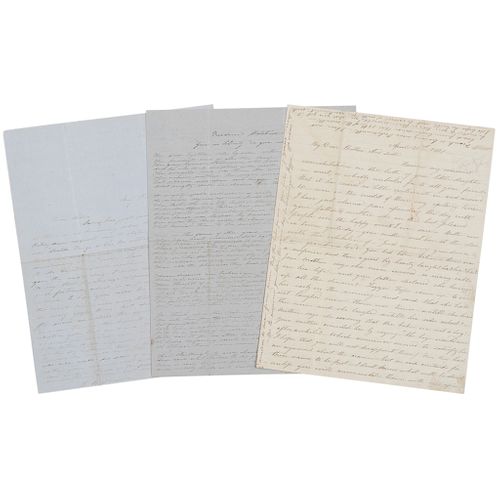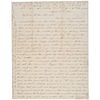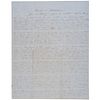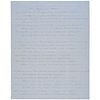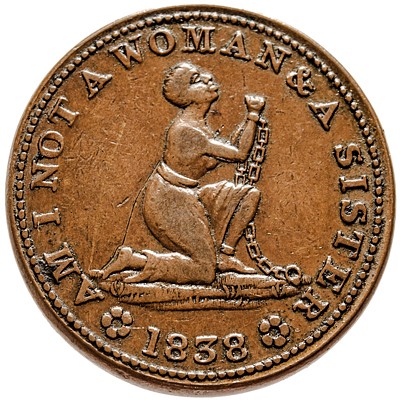(JAMES WILLIAM DENVER) 4 Letter Archive. Whom the City of Denver, CO. is named
Lot 113
Categories
Estimate:
$600 - $800
Absentee vs Live bid
Two ways to bid:
- Leave a max absentee bid and the platform will bid on your behalf up to your maximum bid during the live auction.
- Bid live during the auction and your bids will be submitted real-time to the auctioneer.
Bid Increments
| Price | Bid Increment |
|---|---|
| $0 | $10 |
| $200 | $20 |
| $300 | $25 |
| $500 | $50 |
| $1,000 | $100 |
| $2,000 | $200 |
| $3,000 | $250 |
| $5,000 | $500 |
| $10,000 | $1,000 |
| $20,000 | $2,000 |
| $30,000 | $2,500 |
| $50,000 | $5,000 |
| $100,000 | $10,000 |
| $200,000 | $20,000 |
| $300,000 | $25,000 |
| $500,000 | $50,000 |
About Auction
By Early American History Auctions
Feb 27, 2021
Set Reminder
2021-02-27 12:00:00
2021-02-27 12:00:00
America/New_York
Bidsquare
Bidsquare : Black History & Slavery, Historic Autographs, Colonial America & Weapons
https://www.bidsquare.com/auctions/early-american-history-auctions/black-history-slavery-historic-autographs-colonial-america-weapons-6434
318 Lots of Rare, Historic Autographs, Americana, Civil War Era, George Washington, Abraham Lincoln, Slavery & Black History, Revolutionary War Era, Colonial America, Federal Period, War of 1812, Colonial Currency, Historic Early American Guns & more... Early American History Auctions auctions@earlyamerican.com
318 Lots of Rare, Historic Autographs, Americana, Civil War Era, George Washington, Abraham Lincoln, Slavery & Black History, Revolutionary War Era, Colonial America, Federal Period, War of 1812, Colonial Currency, Historic Early American Guns & more... Early American History Auctions auctions@earlyamerican.com
- Lot Description
Autographs
"MARY C. DENVER" Signed Four Letter Archive
"MARY C. DENVER" Signed Archive, Sister of (JAMES WILLIAM DENVER), Mexican War Captain, as the Commander in Army of the Tennessee, for whom the City of Denver, Colorado is named.
"MARY C. DENVER" Signed Four (4) Letter Archive, including Two (2) Letters and Three (3) Poems (two being together) from Mary Denver, James' sister, Signed "Mary C. Denver". Mary was a contributor to the "Authors" magazine and a book of her poems was published after her death.
1. Letter dated 1861, The content of this letter is about the beginning of the Civil War. Mary's writing has a poetic rhythm: "But I must now turn to another and less agreeable subject -- War -- Civil war, is upon us, with all its honors!... Bragg is firing on Fort Pickens at this time (Of course you have heard of the surrender of Sumter)." This letter includes lots of other great Civil War content.
2. May 9, 1846, Letter to William, "I would rather you would not publish the poetry I sent you as all three of the pieces have been published several times before but suit yourself . When Life's evergreen wreath round they temple is twined Forget not the Messenger Rose!"
These letters are very nice and clear, all have typical folds. The May 9, 1846 letter has two small tears at the center folds. Although one tear slightly disturbs the text the letter is still very easy to read.
Two of Mary's poems are also included in the lot:
3. "The Messenger Rose"
4. "Freedom's Watchword"
This historic archive would seem to be best destined to a City of Denver museum or library collection. (4 items)
The Battle of Fort Sumter (April 12, 1861 - April 13, 1861) was the bombardment and surrender of Fort Sumter near Charleston, South Carolina that started the American Civil War.
James W. Denver was born near Winchester, Virginia. He moved to Ohio with his parents in 1830, settling near Wilmington. In 1841 he taught school in Missouri, and in 1844 he graduated from the law school of the University of Cincinnati. He moved to Platte City, Missouri, in 1845, where he continued his law practice. In 1847, during the Mexican-American War, he recruited a company for the 12th U.S. Volunteer Infantry and was commissioned a captain, After the war in 1850, Denver traveled to California, where he became a trader.
Denver killed newspaper editor Edward Gilbert in a duel on August 2, 1852. Later that same year, he was elected to the California State Senate. He was later appointed as Secretary of State of California. In 1854 he was elected to the United States Congress as representative from California, serving from March 4, 1855-March 3, 1857. He was not a candidate for renomination in 1856. On April 17, 1857, President James Buchanan appointed him as Commissioner of Indian Affairs. In December 1857 he was appointed as Territorial Governor. On the day that Denver assumed the territorial governorship, citizens in the territory voted on the Lecompton Constitution, which opened the territory to slavery. The vote offered a choice only between full slavery and limited slavery in the territory and was thus largely boycotted by Free-Staters who were in favor of abolishing slavery. The pro-slavery constitution passed by an overwhelming margin. Later it was discovered that several thousand votes were cast fraudulently by "border ruffians" who had crossed into the territory from Missouri in order to cast pro-slavery ballots (The vote was overturned by a subsequent election in August 1858, and Kansas was later admitted to the Union in 1861 as free state.). A few months after the start of the American Civil War in early 1861, President Abraham Lincoln commissioned Denver a brigadier general in the volunteer army on August 14. During early 1862, Denver commanded the 3rd Brigade/5th Division during the Siege of Corinth. In November 1861, he was ordered to report to Fort Scott in Kansas. In December, he assumed command of all Federal troops in Kansas. He resigned from the Union Army on March 5, 1863. After the end of the war, Denver practiced law in Washington, D.C., and Wilmington, Ohio, served as a delegate to Democratic National Convention in 1876, 1880, and 1884 and was mentioned as possible Democratic presidential nominee in 1876 and 1884, although his name was never offered into formal nomination. Denver reportedly visited Denver, Colorado in 1875 and 1882, but complained that his visits received little attention from the residents of the city named after him. He died in Washington, D.C. in 1892 and is buried in Sugar Grove Cemetery in Wilmington, Ohio. His son, Matthew R. Denver, was a U.S. Congressman from Ohio from 1907-1913.
Our Auction Contents:
Black History & Slavery: (Lots 1 - 63)
Abraham Lincoln Related: (Lots 64 - 74)
Historic Autographs: (Lots 75 - 235)
Colonial America: (Lots 236 - 261)
Revolutionary War: (Lots 262 - 304)
George Washington Related: (Lots 305 - 306)
Early American Guns & Weapons: (Lots 307 - 318) - Shipping Info
-
Early American provides in-house worldwide shipping. Please contact us directly if you have questions about your specific shipping requirements.
-
- Buyer's Premium



 EUR
EUR CAD
CAD AUD
AUD GBP
GBP MXN
MXN HKD
HKD CNY
CNY MYR
MYR SEK
SEK SGD
SGD CHF
CHF THB
THB